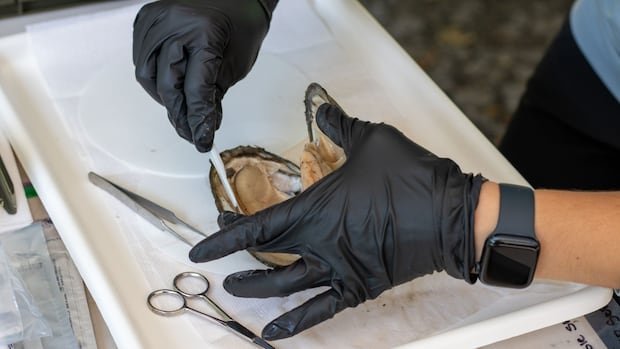A group of scientists is conducting research on mussels in the Grand River in Brantford, Ontario to gain insights into the impact of certain chemicals on the environment. Led by Patty Gillis, a research scientist from Environment and Climate Change Canada, the team is based at the Canada Centre for Inland Waters in Burlington, Ontario.
The team uses native freshwater mussels as indicators of water quality to investigate the distribution and effects of contaminants. Mussels, known for their stationary nature, reside in sediment and filter water through their gills, making them susceptible to contaminants present in the water and riverbed.
Gillis mentioned that mussels could be exposed to substances like metals or pharmaceuticals in the river, affecting their health. By analyzing a piece of their tissue, the team can quantify the impact of such contaminants.
The researchers are collecting samples downstream of the municipal wastewater treatment plant to study the effects of individual chemicals and chemical mixtures on various mussel species. This effort is part of the Integrated Chemical Mixtures Project (ICMP), a pilot project examining sites in Brantford and Windsor, Ontario.
Mark Hewitt, a Burlington chemist and coordinator of the ICMP project, highlighted the importance of understanding complex chemical mixtures, emphasizing the need for Canadians to be informed about them. The project aims to explore the unknown aspects of these mixtures and pave the way for identifying solutions to potential harmful effects.
The ICMP project aligns with the federal government’s commitment to a healthy environment, emphasizing a collaborative approach to comprehensively assess the impacts on both human health and the environment. By comparing findings with other ICMP teams, researchers can evaluate the extent of chemical concentrations in mussels’ tissues.
The project encompasses various research activities, including analyzing stress levels in mussels, studying different species like snails, birds, and fish, and investigating chemical impacts near industrial areas. The team in Brantford employs a mobile lab to conduct fieldwork, such as measuring mussels, collecting samples, and dissecting specimens for further analysis.
Gillis plans to expand the research by placing mussels upstream and downstream of the wastewater plant and industrial zones to monitor stress levels and chemical accumulation. This multi-faceted approach aims to provide a comprehensive understanding of how different organisms respond to chemicals in their environment, ultimately contributing to broader environmental insights.
The team is currently in the data collection phase, with future plans to delve deeper into identifying the causes of observed effects. The ultimate goal is to extend this research to other locations across Canada for a more comprehensive assessment of chemical impacts on aquatic ecosystems.


